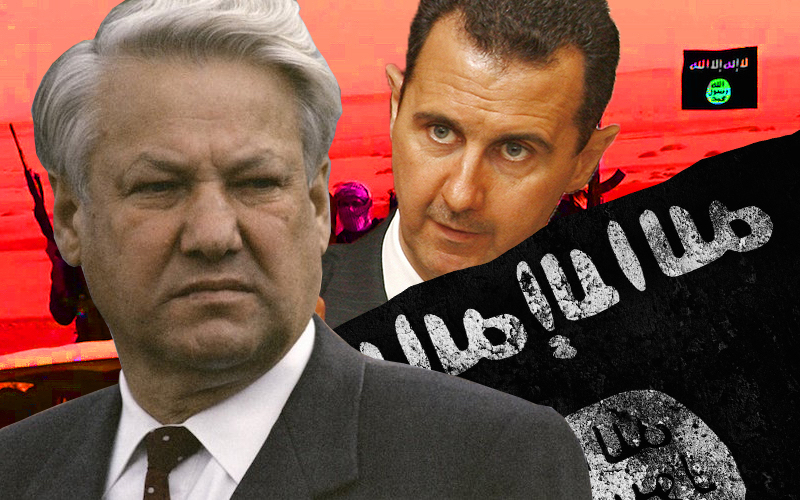
Boris Yeltsin’s Long Shadow on The Syrian Civil War
Two important events occurred recently with respect to the current bloodshed in Syria. The first is that Duma elections solidified Vladimir Putin’s United Russia Party’s hold on the reins of the Russian government. The second is that both Russian and French resolutions regarding Syria were blocked at the United Nations.
While the Duma elections and United Nations resolution processes seem disparate, they are in fact strongly interrelated. The Syrian Civil War has been escalating with no end in sight; the Assad regime, ISIL, and the anti-Assad coalition have created the foreign policy dilemma of the decade that historians will write volumes about in terms of the history and consequences for the Middle East. Russia’s steadfast support for the Assad regime and the US-Russia breakdown in negotiations that occurred last week are products of Boris Yeltsin’s presidency, which continues to haunt Russian leaders and their constituents.
Vladimir Putin won his second presidency in 2012 after his party’s unexpected loss of absolute dominance in the Duma elections in 2011. 2016 proved to be another enhancement of Putin’s control of the Russian government as his party’s grasp on power is now unchallenged after recent Duma elections and Putin is heading into the 2018 reelection cycle as the clear frontrunner to win the presidential election. Vladimir Putin’s foreign policy will continue as the Kremlin thwarts the West and bolsters the Assad regime.
The Russian veto of the French (and American) resolution regarding Syria was a direct result of the foreign policy and national debacles that plagued the Yeltsin presidency during the 1990’s. In the three decades since the inception of the Russian Federation, no period of time has been more influential in the current mindset and leadership of the Kremlin than the Yeltsin years.
Yeltsin’s Kremlin bore few similarities to the current Russian leadership. Boris Yeltsin was plagued with alcoholism and neurological maladies, which certainly compounded his lack of discipline and ability to communicate with the Russian people and the world. In addition to this, his inner circle was known as “the Yeltsin bureaucratic mafia.” The corruption and ineptitude that characterized the Kremlin of that era has not been seen since Vladimir Putin became president in 2000. The same applies to Russian foreign policy.
During the 1990’s the United States wholeheartedly supported Boris Yeltsin, especially during his 1996 reelection campaign, but Yeltsin was unable to lead his country’s foreign policy and security interests with the ability of a disciplined, capable statesman. The Russian understanding of the unification of Germany was that NATO would not expand eastward of East Germany. These assurances were never formalized, and if they were conveyed to Mikhail Gorbachev, they were not legally binding. NATO expanded exponentially to the chagrin of Boris Yeltsin who lacked the ability to counter the “NATO-Western threat” to the Russian Federation.
Boris Yeltsin and Bill Clinton’s amiable relationship descended into a bitter last meeting after Boris Yeltsin’s most painful and embarrassing foreign policy blunder: the NATO bombing of Yugoslavia. The chaos of the fracturing of Josip Tito’s multi-ethnic, multi-lingual, multi-religious country became the focal point of the international community after Slobodan Milosevic’s ethnic cleansing and genocide required humanitarian intervention. The Russian forces in the Balkans were not acting with the West and NATO in unison; specifically, Russian sympathies for Serbia prompted Boris Yeltsin to intervene in a hybrid fashion of unilateral Russian decision-making and conducive relations with the West during the 1999 Serbian-Kosovar war. This rickety Western-Russian intervention in the former Yugoslavia nearly ended in NATO and Russia escalating the tension in regard to overlapping military campaigns by starting what may have become World War 3. A nuclear holocaust was averted as NATO and Russia ignored the inflamed security dilemma by decreasing military levels and pursuing dialogue instead of escalation.
Vladimir Putin inherited a Russia that was forced to accept an international security balance skewed against it at the cost of NATO expansion. Immediately after becoming president, Putin pursued all measures to thwart NATO from increasing its security leverage against Russia. Both Professor Robert Jervis and Professor Stephen Cohen warned that uninterrupted and exponential NATO expansion would create poisonous relations between Russia and the West. Their warnings were ignored, and since 2000 three key NATO “encroachments” have created Russia’s intransigence on the Syrian foreign policy dilemma. The Baltic States became members of NATO, which destroyed all of Russian nuclear and military mobility in Western Russia. The installation of the US-NATO missile defense shield in Prague to counter Iranian nuclear weaponization added to Russia’s chagrin. The third stems from George W. Bush’s decision to withdraw from the Anti-Ballistic Missile Treaty, which Russia interpreted as the US and NATO choosing to pursue a buildup and expansion of nuclear and missile defense capabilities presumably against Russia.
Putin famously lectured Bush on the virtues of fair and cooperative threat reduction in terms of missile defense, which was ignored by all who listened. The exponential momentum of US-NATO forces was unstoppable when Putin inherited it from Yeltsin, who was ill-equipped to deter it.
Putin has pursued a foreign policy that he crafted as a response to Yeltsin’s dismal foreign policy with respect to NATO encroaching the eastern hemisphere. Syria has become Vladimir Putin’s countermove to US-NATO forces leveraging international security against the Russian Federation. In addition to this, the 1990’s saw Chechnya and the North Caucuses as a battleground for Russia’s fight against Islamic extremism. Russia has maintained support for all secular nationalists in the Middle East such as Saddam Hussein and Bashar al-Assad. The trauma of Yeltsin’s disastrous military campaigns against Chechnya’s Islamic extremists has necessitated a foreign policy that would support the Assad regime against ISIL and the anti-Assad coalition, which contains Al Qaeda operatives. Russia’s trauma from the 1990’s would preclude any support for anyone except secular nationalist President Assad.
Boris Yeltsin’s inability to wage a successful military campaign against Islamic extremists in Russia and poor foreign policy and international security statesmanship against NATO expansion have forever set Vladimir Putin on a foreign policy path that both supports secular nationalists and thwarts the increasing US-NATO security balance against it. The Kremlin is controlled by a party and president who will most likely stay in power until 2024 and aim to conduct a foreign policy that is the antithesis to the Yeltsin foreign policy that created the current balance of international security. The trauma of the 1990’s will preclude any Russian foreign policy decision to accept international resolutions or policy decisions against the Assad regime. Russia’s intransigence in the Syrian Civil War will continue unabated.
